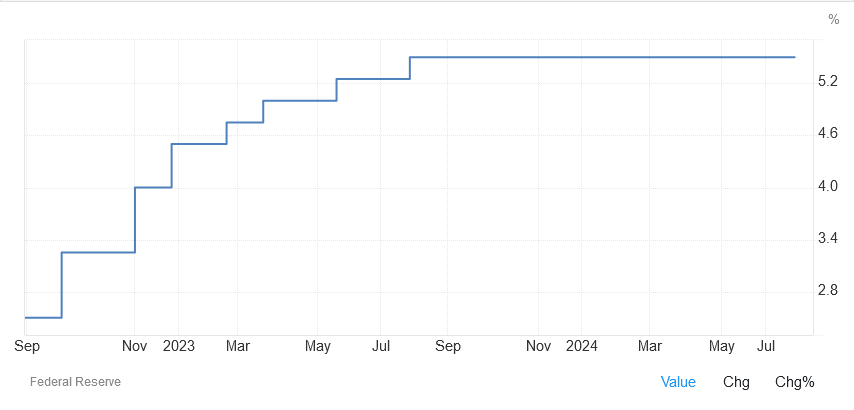Chris Trottier on Nostr: Is the stock market gambling? Well, gambling implies a game of chance. What's ...
Is the stock market gambling?
Well, gambling implies a game of chance. What's happening on the stock market *right now* isn't by chance -- it's predictable.
Let's rewind and look at the catalyst for why the stock market is falling.
In July 2023, the Fed moved interest rates to 5.5%. It has remained unchanged for more than a year.
The reason the Fed has not lowered interest rates is because they're playing a game of who would blink first. They want an inflation rate that moves towards 2%, and capitulation of the labour and stock markets.
Despite the move to 5.5%, inflation proved stubborn, the job market was resilient, and the stock market hit all time highs. And much of this was due to *speculation* that the Fed would "soon" lower interest rates which has not happened yet.
Last month, inflation finally fell below 3%. This wasn't 2%, but was movement. So the Fed met in July -- didn't lower interest rates -- but implied that lower rates were "on the table".
Then a job report came showing that the U.S. employment rate rose to 4.3%. This was unexpected because economists thought it would be at 4.1%. A bigger uptick implies a trend that unemployment may rise even further.
So now we're at the point where a lower interest rate is no longer just "on the table". It better happen because if it doesn't happen, the stock market will lower further. The stock market won't just fall, credit defaults will likely rise.
If you look at every major recession of the past 25 years, it was presaged by high interest rates. In 2007, interest rates were at 5.25%; in 2000, they were at 6.5%.
Everything is predictable. It all starts and ends with the Fed.

Well, gambling implies a game of chance. What's happening on the stock market *right now* isn't by chance -- it's predictable.
Let's rewind and look at the catalyst for why the stock market is falling.
In July 2023, the Fed moved interest rates to 5.5%. It has remained unchanged for more than a year.
The reason the Fed has not lowered interest rates is because they're playing a game of who would blink first. They want an inflation rate that moves towards 2%, and capitulation of the labour and stock markets.
Despite the move to 5.5%, inflation proved stubborn, the job market was resilient, and the stock market hit all time highs. And much of this was due to *speculation* that the Fed would "soon" lower interest rates which has not happened yet.
Last month, inflation finally fell below 3%. This wasn't 2%, but was movement. So the Fed met in July -- didn't lower interest rates -- but implied that lower rates were "on the table".
Then a job report came showing that the U.S. employment rate rose to 4.3%. This was unexpected because economists thought it would be at 4.1%. A bigger uptick implies a trend that unemployment may rise even further.
So now we're at the point where a lower interest rate is no longer just "on the table". It better happen because if it doesn't happen, the stock market will lower further. The stock market won't just fall, credit defaults will likely rise.
If you look at every major recession of the past 25 years, it was presaged by high interest rates. In 2007, interest rates were at 5.25%; in 2000, they were at 6.5%.
Everything is predictable. It all starts and ends with the Fed.

